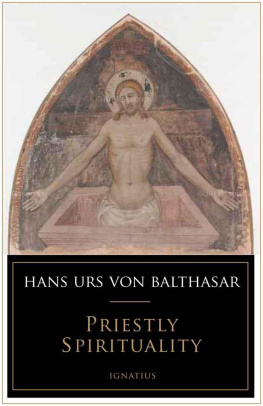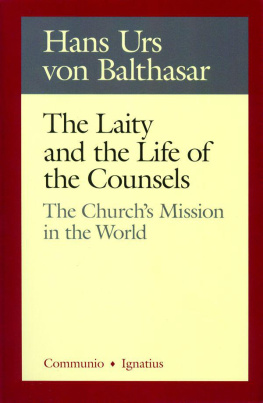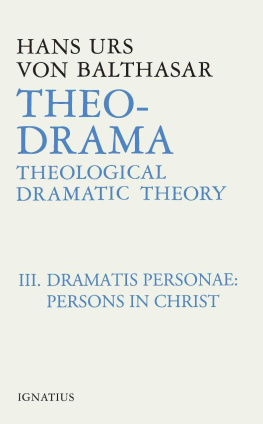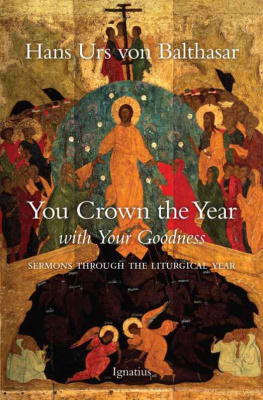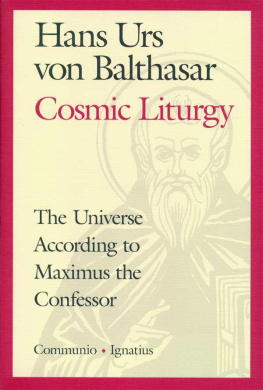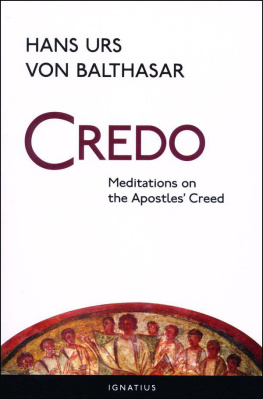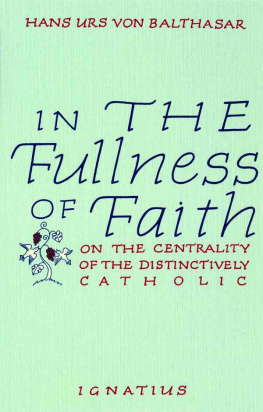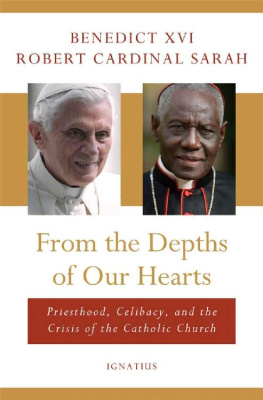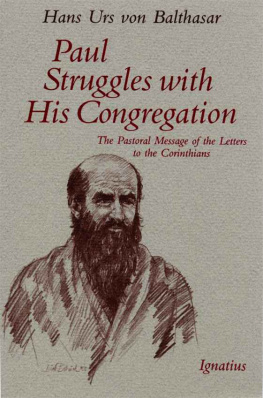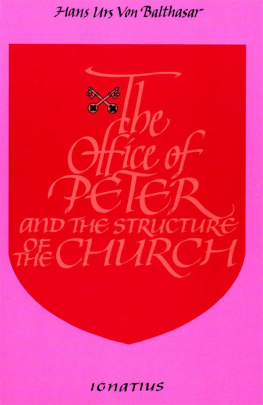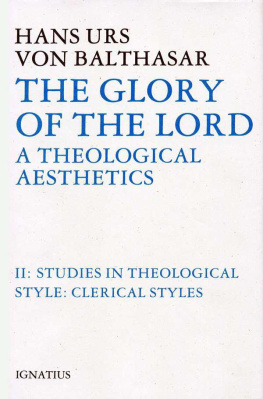PRIESTLY SPIRITUALITY
HANS URS VON BALTHASAR
PRIESTLY
SPIRITUALITY
Translated by Frank Davidson
IGNATIUS PRESS SAN FRANCISCO
Original German edition:
Priesterliche Spiritualitt
2007 by Johannes Verlag Einsiedeln, Freiburg
Cover art:
Man of Sorrows
Anonymous, 14th century. Ca. 1370, Italy, Florence
Fresco on canvas
The Cloisters Collection, 1925 (25.120.241)
The Metropolitan Museum of Art, New York
The Metropolitan Museum of Art / Art Resource, New York
Cover design by Roxanne Mei Lum
2013 by Ignatius Press, San Francisco
All rights reserved
ISBN 978-1-58617-693-8
Library of Congress Control Number 2013930749
Printed in the United States of America
CONTENTS
FOREWORD
Priesthood and crisis are two words that appear to be very closely related. Or so it has seemed, at any rate, for the past thirty years and more. The crisis in the priestly ministry is constantly showing new sides, howeverthe issue of the priests own self-understanding, for example, the interplay of the various different vocations within the Church, and the struggle, in the face of a plethora of different offices and ministries, to discern what constitutes the specific priestly dimension and identity. Then there is the stress and overload suffered by many priests as a result of the constant structural changes, the sense of having perhaps worked in vain and for nothing, when there is no sign of successor at any rate of any lasting successto be seen. Added to this there is the great concern for the future and the problem of awakening new vocations to the priesthood. Are not all these issues interrelated? So, at least, many people rightly ask. The discussion about celibacy as the priestly way of life returns again and again in a series of waves. The question about the nature of the priesthood has been rendered yet more acute by the clear doctrinal statement of the Magisterium that the Church does not have the authority to bestow this ministry upon women. Again and again, in his theological writings, Hans Urs von Balthasar has addressed the fundamental issues of office and ministry, of priesthood and discipleship. In the volumes of his Skizzen zur Theologie , especially in Pneuma und Institution and also in Sponsa Verbi , he has uncovered the foundations from a biblical and theological-historical perspective and has offered answers to the current problems of priestly existence. What he expounded there in broad brushstrokes he has summarized in very concentrated form in a series of shorter essays and articles to be found scattered among various publications. This concentration and density are found here in the present volume. The reader does not linger at the surface but is required to penetrate into the most profound and intimate content of revelation about Christs work in his Church and about the mission he gave in the sacramental office and the radical nature of what it means to follow him.
Here, what is of enduring validity in the current problem situations is expressed. The reader will observe the confrontation with relevant trends and at the same time the opposing current generated by von Balthasar, since he does not follow popular positions but instead gives us the very core of the Gospel and of revelation, like rye bread. It takes perseverance and fidelity to read it, perhapsbut these are ultimately rewarded by its nourishing substance. It is reading that invites us to thoughtful contemplation and deeper reflection. The collection is therefore set out in such a way that one is not obliged to read the articles in sequence in order to understand their overall connection. Instead, one can start anywhere and will always be led to the center. At the same time a systematic approach in the structure is revealed and is perceptiblethe center is office, is existence. It is a teaching not so much about the priesthood as about priestly existence as such, which takes shape only in the spirit and in the truth of its origins. It is fed by the bold presumption of the Lord in entrusting his mission to weak men and then strengthening them through his own life of total self-giving and through the support offered by the pure figure of the Church in Mary and in her enduringly fruitful fiat . Only when God, made manifest in the figure of the Savior Jesus Christ, is understood as the center from which this priestly existence springs, and only when this enduring center is proclaimed, can this presumption be understood in confident trust and attract new followers, even in lean times.
Felix Genn
Bishop of Essen
INTRODUCTION TO THE TEXTS
The essays and articles by Hans Urs von Balthasar on priestly spirituality that have been gathered together in this volume form neither a unified nor an exhaustive treatise but are instead a collection of texts written on different occasions and for different reasons. Nevertheless, the unity underlying them is revealed in the understanding of priestly spirituality. How is this to be characterized? What features does he emphasize?
In order to illuminate the life of the priest of today, von Balthasar goes back to the origins, to the apostles, to their calling, to their wanderings with Jesus along the roads of Galilee in Judaea, and above all to that moment from which their apostolic mission and their entire Christian existence originates, namely, the Paschal mystery of Jesus. On the eve of his death, Jesus establishes the Eucharist and the priesthood; immediately after his Resurrection he bestows on the disciples the power to forgive sins, entrusts his sheep to Peter, and sends all eleven of them out into the whole world. Thus von Balthasar considers the life and mission of todays shepherds in continuity not only with the first apostles but above all with Jesus himself. The person and mission of Jesus Christ stand at the center of priestly spirituality. Hence all the reflections in the texts that follow revolve unswervingly around Jesus Christ and his mission. Jesus is the source and norm of priestly existence.
The priestly office signifies the power to exercise authority for the good of the community. This authority comes, not from below, from men, but from above, from God, from Christ. No one can appropriate this authority to himself; no one has a right to it. Mission always comes from God. And for this mission God demands the whole person. The one who is called relinquishes, completely, his own self, his private life. Everything is given for the sake of the mission, which is one of service for the People of God. God expects of the one called that he will place himself wholly at his disposal, in faith, in obedience, and in inner self-abandonment; that he will entrust himself unreservedly to the guidance of God. The awareness of having been called by God and the identification with the mission thereby accepted form the identity of the one who has left everything.
It belongs to the task of the shepherd not only to transmit the message authentically and with authority, but also to live it. The shepherds must be examples to the flock (1 Pet 5:3). This is possible only if the existence of the one proclaiming is in harmony with the Word proclaimed. Von Balthasar returns again and again to this unity between the objective authority, derived from the sacrament of Holy Orders, and the personal, existential commitment of the priest. The priesthood is a matter, not of a profession, but of participation in the redemptive work of Christ, a personal and existential participation that will cost the individual concerned his entire personal life. The priest must engage in his mission with his whole person. The authority to act in the name of Christ is unthinkable except in living communion with Jesus. In the New Covenant there can be no office that is not existentially covered , von Balthasar writes. For Jesus himself represents the perfect combination of mission and person. Jesus Christ is purely and simply the identity of office and existence, the mission personified. In his redemptive suffering he is at once Priest and Victim; he is the one officiating and the one who suffers to the ultimate degree. Jesus is the executor of the priestly office only to the degree that he experiences himself, existentially, as a Victim offered to God. If the authority of the priestly office is to endure in his Church, then it can only be in close association with the existential form of total self-emptying and self-offering. The priesthood of the New Testament is participation in the identity of Priest and Victim.
Next page
